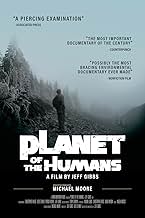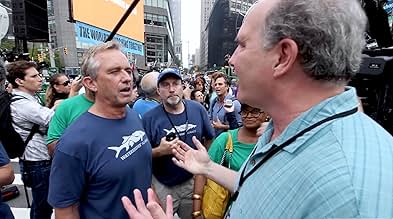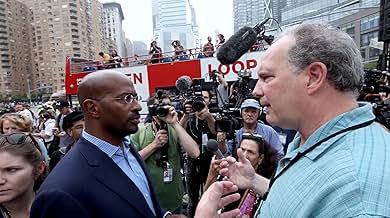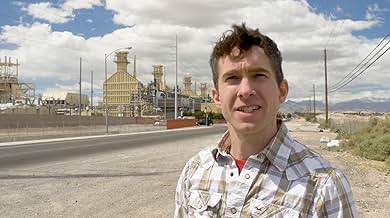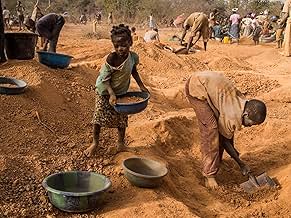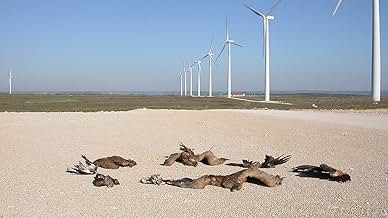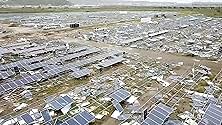Planet of the Humans
- 2019
- 1h 40m
ÉVALUATION IMDb
6,9/10
3,4 k
MA NOTE
Un regard sur la façon dont le mouvement environnemental a perdu la bataille par des choix bien intentionnés mais désastreux.Un regard sur la façon dont le mouvement environnemental a perdu la bataille par des choix bien intentionnés mais désastreux.Un regard sur la façon dont le mouvement environnemental a perdu la bataille par des choix bien intentionnés mais désastreux.
Avis en vedette
I'm not a tree hugger, but I do recognize the need to find renewable energy sources that are both efficient and scalable. "Planet of the Humans" outlines the planet's predicament and the environmental movement's response. But many of their efforts are ill coordinated and managed by industries that focus more on their bottom line than an overriding concern for planet earth. This is an important film, with lots of suggestions, revelations and some let's-take-a-closer-look-at-it ideas. If the environmental objective is planet preservation, then I hope we can all rally around this film's knowledge base. Not because it doesn't follow "an agenda" (because it certainly does), but because we're gonna need lots of diverse (even contrasting) perspectives - maybe even like some that are outlined here. Everyone needs to educate themselves (and be open-minded) with what works and what doesn't. And we all need to be on board this ecology train if we're gonna win this battle to save our planet (as inconvenient as that truth may be).
This film has all the usual hallmarks of a Michael Moore documentary, quotes taken out of context, emotionally manipulative scenes that shock and overwhelm. Most people will come out of the movie looking for someone to blame. Al Gore? Bill McGibbon? Elon Musk? As my neighbour said tonight about the coronavirus, "I have to find someone to blame." At first I said there is no one to blame. But she doubled down. I repeated it again. But she shook her head smiling. I wanted to believe that she wasn't doubling down but just joking with me. Maybe she was. My partner says she wasn't.
I think it's important to note that the message the movie is : Our current way of life is not sustainable by any means. Now if you want to know what the movie is trying to show, it illustrates how environmentalists are in bed with the traditional fossil fuel business. Whether they are, knowingly or not, might be up for debate. It is possible that Al Gore and Bill McKibbon are stupid or naïve and want to believe that the fossil fuel businesses care. Maybe they think these businesses really want to find a sustainable alternative. Maybe they do. Maybe they are at war with their inner greed, hate, and ignorance. If we don't have someone blame, then we have to look inward, perhaps acknowledge how much we need to change, collectively. No one wants to do that. Everyone wants an easy answer that we can add to our personal narratives and belief systems.
It's not about blaming someone. It's way beyond that. Is Dennis McKenna on to something when he says that Gaia, through the SARS-COV-2, is trying to teach us something? Virologists would say, "Nonsense." We've had epidemics and pandemics before. Humankind just picks itself up, dusts itself off, and continues to gorge on the fruits of the earth with abandonment. This film is trying to warn that it is the same when it comes to the climate crisis.
I think it's important to note that the message the movie is : Our current way of life is not sustainable by any means. Now if you want to know what the movie is trying to show, it illustrates how environmentalists are in bed with the traditional fossil fuel business. Whether they are, knowingly or not, might be up for debate. It is possible that Al Gore and Bill McKibbon are stupid or naïve and want to believe that the fossil fuel businesses care. Maybe they think these businesses really want to find a sustainable alternative. Maybe they do. Maybe they are at war with their inner greed, hate, and ignorance. If we don't have someone blame, then we have to look inward, perhaps acknowledge how much we need to change, collectively. No one wants to do that. Everyone wants an easy answer that we can add to our personal narratives and belief systems.
It's not about blaming someone. It's way beyond that. Is Dennis McKenna on to something when he says that Gaia, through the SARS-COV-2, is trying to teach us something? Virologists would say, "Nonsense." We've had epidemics and pandemics before. Humankind just picks itself up, dusts itself off, and continues to gorge on the fruits of the earth with abandonment. This film is trying to warn that it is the same when it comes to the climate crisis.
The biggest flaw in this film was excluding a discussion of the obvious solution to the problem...Nuclear power. The gen 3 reactors currently in operation are far safer than their earlier predecessors, and future gen 4 reactors should be capable of operating without generating radioactive waste and with zero melt down risk. Gen 4 reactors are projected to be commercial viable as early as 2030. Conversely, the film did an excellent job of demonstrating the folly and impracticality of "green technologies" such as solar and wind.
8AJ4F
Critics of this film tend to be "green growth" junkies who think they're better than fossil fuel junkies. They're also eco-traitors for wanting to obliterate scenery and wildlife with millions of wind turbines. 3/4ths of the film could have dwelled on that topic. It also should have compared nuclear (SMR and other designs) to the footprint of wind. Too many Greens claim carbon is the only footprint that matters now.
But most points were strongly made. It was good to see candor on growth ideology from a well-known documentarian. Similar films from minor producers will never get the same coverage. Overpopulation was mentioned early on and repeated several times. Vain human nature was also discussed, and I think that's what offends techno-optimists the most.
In the limited time allotted for a film, it managed to cover most of the problems with "clean energy" and the "100% renewable" lie, though it didn't really mention carbon credit trickery. I only wish it had shown the vast scale of wind farms instead of a few cameos from Lowell Mountain construction, and quick shots of built projects.
There's been predictable resistance and it was temporarily pulled by the FFA site, with their own spin on why it's unfair to greentech people. Those who say it lacks "solutions" are assuming there MUST be solutions to overshoot of carrying-capacity. Says who? Look at the actual trends. They reject anything that's not endlessly hopeful, so I can see why Moore made it free online. Critics have a few points about dated material with some interviewees changing their stances, but the fundamental problems remain.
The big revelation for me was the volume of trees counted as "renewable" biomass energy, dwarfing the relatively feeble output of wind and solar. Taking away biomass makes clean energy look paltry. I still like solar when it's done right (keep it off open space).
Gibbs and Moore should do a followup in 5 or 10 years, especially if shale fracking has peaked and there's a major "We told you so!" crisis..
But most points were strongly made. It was good to see candor on growth ideology from a well-known documentarian. Similar films from minor producers will never get the same coverage. Overpopulation was mentioned early on and repeated several times. Vain human nature was also discussed, and I think that's what offends techno-optimists the most.
In the limited time allotted for a film, it managed to cover most of the problems with "clean energy" and the "100% renewable" lie, though it didn't really mention carbon credit trickery. I only wish it had shown the vast scale of wind farms instead of a few cameos from Lowell Mountain construction, and quick shots of built projects.
There's been predictable resistance and it was temporarily pulled by the FFA site, with their own spin on why it's unfair to greentech people. Those who say it lacks "solutions" are assuming there MUST be solutions to overshoot of carrying-capacity. Says who? Look at the actual trends. They reject anything that's not endlessly hopeful, so I can see why Moore made it free online. Critics have a few points about dated material with some interviewees changing their stances, but the fundamental problems remain.
The big revelation for me was the volume of trees counted as "renewable" biomass energy, dwarfing the relatively feeble output of wind and solar. Taking away biomass makes clean energy look paltry. I still like solar when it's done right (keep it off open space).
Gibbs and Moore should do a followup in 5 or 10 years, especially if shale fracking has peaked and there's a major "We told you so!" crisis..
I can see greenies being very upset with this documentary - but by no means is it a fossil fuels lobby piece. It's an eye-opening look at Big Green and their hidden secret that renewables like solar, wind turbines, biomass fuel and mega battery storage is actually worse for the earth that Big Coal and Big Oil. Don't be blinded in thinking that today's big renewables are actually going to save us, because they clearly aren't. The bad thing is that this documentary does not offer any solutions beyond depopulating the earth.
Le saviez-vous
- AnecdotesIt was released for free for 30 days on YouTube on the 21st of April 2020 (Earth Day 2020).
- Citations
Narrator: The takeover of the environmental movement by capitalism is now complete. Environmentalists are no longer resisting those with the profit motive, they're collaborating with them.
- ConnexionsFeatured in Outsiders: Episode #5.14 (2020)
- Bandes originalesChilled Cream
Blank & Jones
Interpreted by Blank & Jones
Written by Piet Blank, jaspa Jones, Andy Kaufhold
Published by Soundcolours
Produced, arranged and mixed by Piet Blank, jaspa Jones, Andy Kaufhold
(C) NightsHighNoon Studio, Germany for Soundcolours GmbH & Co. KG
Licenced courtesy of Soundcolours GmbH & Co. KG, www.soundcolours.com
ISRC: DEGE91300132
Meilleurs choix
Connectez-vous pour évaluer et surveiller les recommandations personnalisées
Détails
- Date de sortie
- Pays d’origine
- Sites officiels
- Langue
- Aussi connu sous le nom de
- Планета людей
- Lieux de tournage
- Lansing, Michigan, États-Unis(Mercantile Way: Chevy Volt exhibition, S Cedar St: solar panels, Michigan State Capitol: students rally for green energy)
- sociétés de production
- Consultez plus de crédits d'entreprise sur IMDbPro
- Durée
- 1h 40m(100 min)
- Couleur
- Rapport de forme
- 1.78 : 1
Contribuer à cette page
Suggérer une modification ou ajouter du contenu manquant


